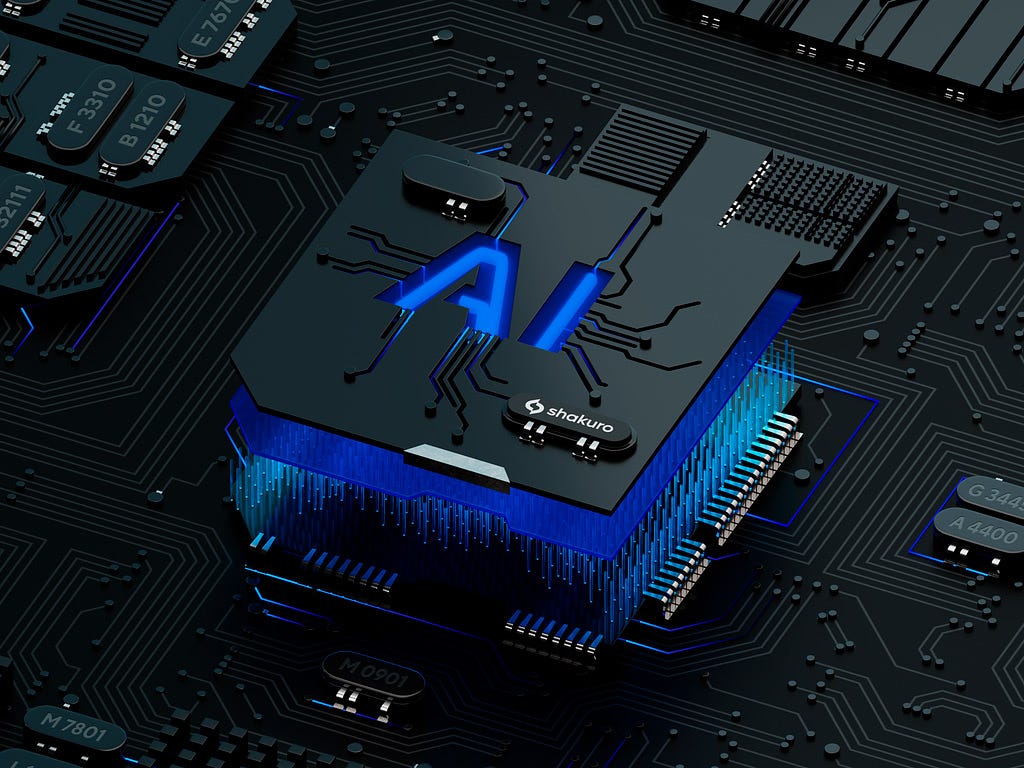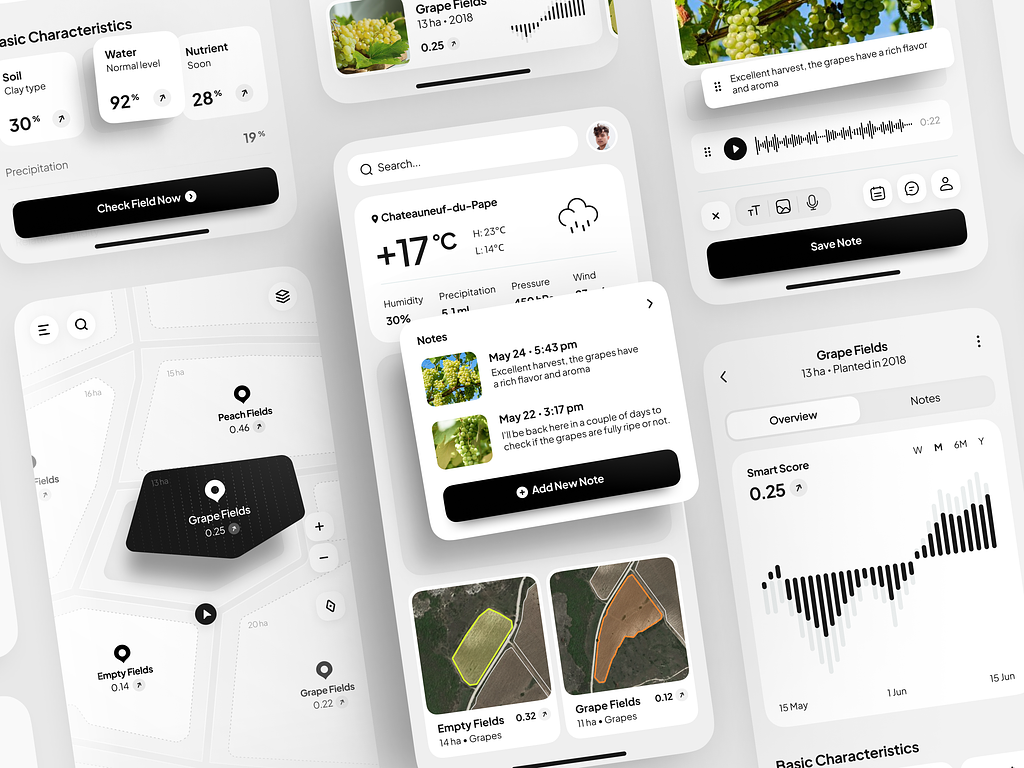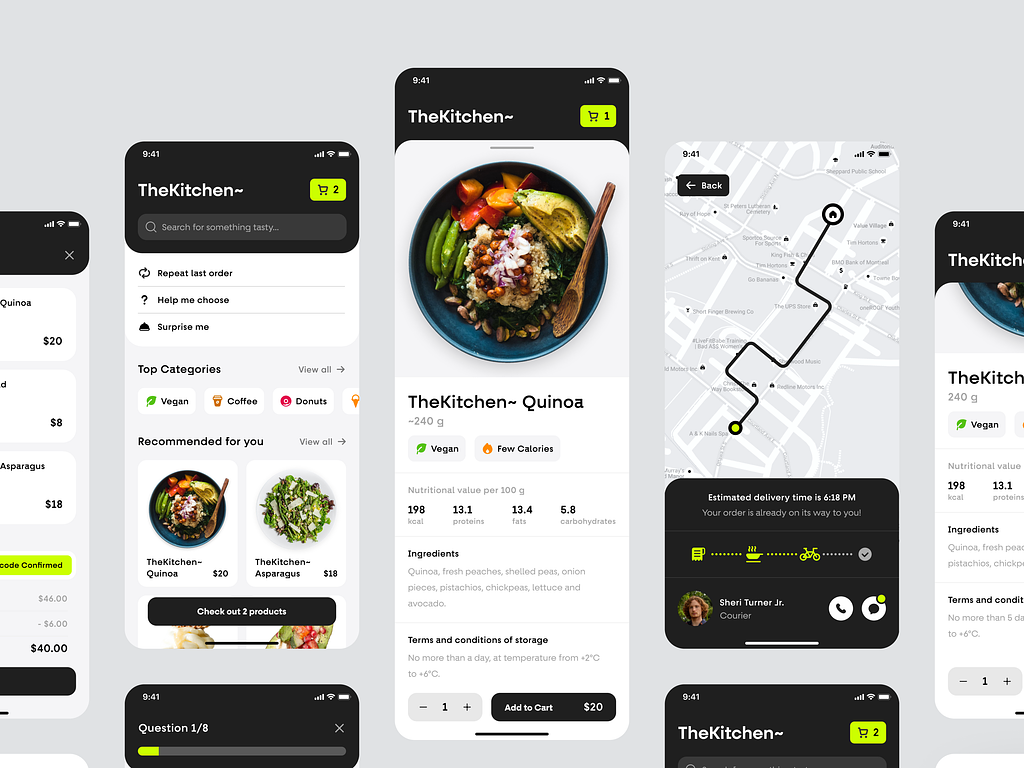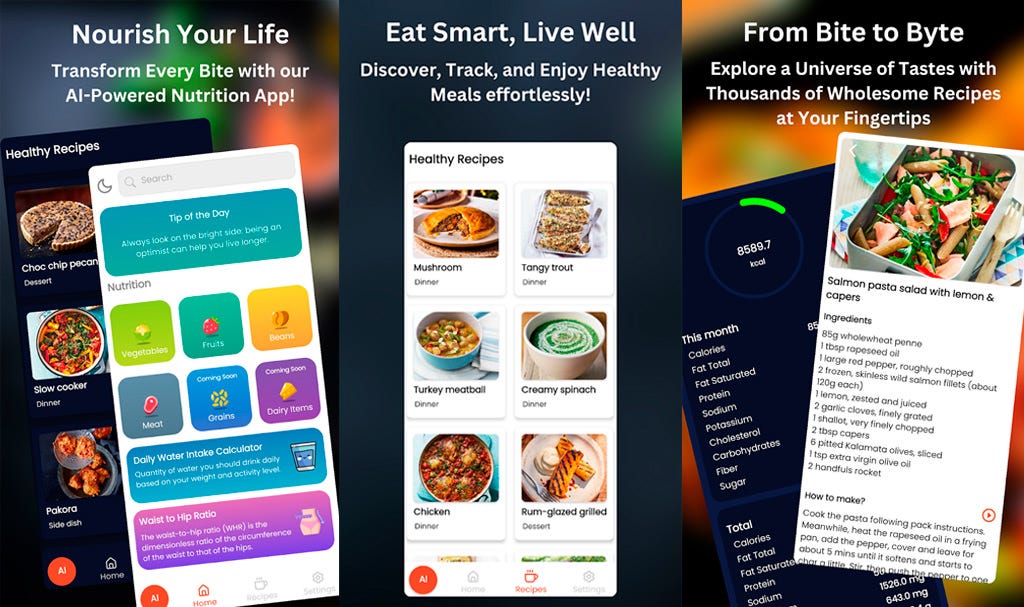By Mary Moore, copywriter at Shakuro

Are you a food industry startup or product owner facing challenges in production efficiency, quality control, or taste consistency? The tantalizing world of Artificial Intelligence beckons, offering a transformative solution to your startup’s pressing woes.
Imagine a realm where production processes are flawlessly optimized, taste profiles are consistently perfected, and quality control reaches unprecedented levels of precision. Embark on an adventure with us as we unlock the tantalizing potential of AI in food industry, unveiling how this cutting-edge technology can revolutionize your startup’s journey to success. Join us on this tantalizing journey through the intersection of technology and gastronomy, and discover how AI is the key ingredient for success in the food industry.
Artificial Intelligence in the food industry
The market statistics for food industry technologies show growth. Together with the drinks sector, it is expected to exceed USD 9.68 billion. The food market is increasing at a CAGR of 38.30% and, by 2029, it is projected to reach USD 48.99 billion.
However, food waste results in economic losses of over $940 billion each year. To lower the numbers, businesses leverage various technologies, like AI.
The technology offers innovative solutions to enhance production efficiency, improve quality control, personalize nutrition recommendations, optimize supply chain management, and leverage customer insights for strategic marketing. As smart algorithms continue to evolve, the possibilities for food automation are virtually limitless, promising a future of increased efficiency.
How AI food is changing the industry
We live in a fast-paced world, and consumer demands become more demanding in speed, affordability, and accessibility. A diversity of food options has set the target audience’s requirements sky-high. So the competition is quite costly for small and medium businesses.
By leveraging AI in food industry, you can cut some corners on your path to success. The technologies are revolutionizing the industry across various sectors, bringing about significant transformations in agriculture, food manufacturing and packaging, supply chains, food delivery, and more.
Here are some notable ways that you can implement into your business.
Agriculture
Food industry technologies are enhancing efficiency and productivity through precision farming techniques. With AI-powered sensors and drones, you can monitor crop health, optimize irrigation schedules, and detect pests and diseases early on, leading to higher yields and reduced environmental impact.
What’s more, Artificial Intelligence is a perfect tool for collecting and analyzing data to optimize planting, irrigation, and fertilization practices. Together with analyzing satellite imagery and sensor data, you can detect crop health issues, pest infestations, and nutrient deficiencies. To minimize human labor and lower costs, small businesses can opt for autonomous vehicles and robots to perform tasks such as seeding, weeding, and harvesting. According to recent research, Artificial Intelligence can help lower agricultural production costs by about 20%.
The iconic agricultural machinery manufacturer, John Deere has invested in AI-powered precision agriculture solutions, which assist farmers in optimizing productivity and sustainability on their farms. Granular (a subsidiary of Corteva Agriscience) offers AI-driven farm management software that helps businesses optimize field operations, manage resources efficiently, and improve decision-making.

Food manufacturing
Artificial Intelligence in the food industry can detect defects, contaminants, or inconsistencies in food products during the manufacturing process. AI algorithms analyze equipment data to predict potential failures, allowing you to proactively schedule maintenance, minimize downtime, and optimize production efficiency.
Food automation enhances supply chain management by forecasting demand, optimizing inventory levels, and streamlining logistics to ensure efficient production and timely delivery of food products. By analyzing consumer preferences, market trends, and ingredient costs, you can optimize recipes for taste, nutrition, and cost-effectiveness. Also, using smart sensors, you can monitor energy usage, identify inefficiencies, and optimize energy consumption in food manufacturing facilities.
The world’s leading pasta maker, Barilla Group, has incorporated AI and machine learning technologies in its production processes to improve efficiency, quality control, and sustainability.
Nestlé, a multinational food and beverage company, uses AI and machine learning to optimize production, improve supply chain visibility, and develop personalized nutrition solutions for consumers.

Food packaging
Machine vision systems inspect packaging materials for defects, ensuring that only high-quality packaging is used for food products. AI can also help you design packaging materials that are more sustainable and eco-friendly, reducing the environmental impact of food packaging. This approach partially reduces human labor, as well as speeds up the workflow.
With automation in food industry, you can analyze data on inventory levels, demand forecasts, and production schedules to optimize packaging materials procurement and utilization.
Looking for examples among potential competitors? In that case, Tetra Pak utilizes AI algorithms to optimize packaging design, material usage, and production processes for their food and beverage packaging solutions. At the same time, Ocado, an online grocery retailer, has implemented AI in its packaging operations to enhance inventory management, packaging efficiency, and order fulfillment.
Cooking
Have you seen the recipes created by neural networks? Some food production companies put them on packaging to lure customers with AI food. People are excited to try the dishes suggested by smart algorithms as if they are diving into a sci-fi movie.
With AI, you can analyze user preferences, dietary restrictions, ingredient availability, and nutritional requirements to provide personalized recipe recommendations in your apps. This helps your clients discover new dishes, save time on meal planning, and create customized menus tailored to their specific needs.
Artificial Intelligence kitchen can offer real-time cooking guidance, step-by-step instructions, and tips for users to prepare dishes with precision and consistency. With the help of cutting-edge technologies, clients reduce food waste, plan meals efficiently, track expiration dates, and use up ingredients before they spoil.
If you own or plan to open a restaurant chain, you can use AI to your advantage, speeding up the business processes. For example, Artificial Intelligence for restaurants automates cooking tasks, such as stirring, chopping, and monitoring cooking temperatures.
Moley Robotics has created a robotic kitchen system incorporating AI and robotic arms to prepare complex dishes precisely and consistently. Users can access a library of recipes, and the robotic kitchen can mimic the movements of professional chefs to recreate the dishes.
LG offers smart kitchen appliances that utilize AI technology to provide personalized cooking recommendations, optimize cooking settings, and streamline meal preparation. Their smart ovens, refrigerators, and cooking appliances can suggest recipes based on ingredients in the fridge and cook food to perfection.

AI food delivery
The fast-paced life we have today requires lightning-fast deliveries. It is hard to track and follow all the orders you have. With AI algorithms, you can optimize delivery routes, allocate resources efficiently, and predict delivery times based on traffic conditions, weather, and order volume. This way, you minimize delivery times, reduce fuel costs, and improve overall delivery efficiency for your restaurants and delivery services.
The tech caters to your users too: it analyzes user behavior, past orders, and preferences to predict what a customer might want to order next. Personalized recommendations and suggestions enhance the customer experience, increase order accuracy, and streamline the ordering process.
Uber Eats leverages AI in food department to optimize delivery routes, predict user preferences, and offer personalized recommendations to customers. Also, the platform uses machine learning to improve courier assignments, estimate delivery times, and enhance operational efficiency for both restaurants and customers.
DoorDash utilizes food automation to predict market demand and improve order accuracy. The company provides AI-powered features such as dynamic pricing, route optimization, and intelligent order allocation to enhance users’ overall food delivery experience.
Top AI food apps
- Nutrino: it is a nutrition-focused app that utilizes Artificial Intelligence to provide personalized menu recommendations and meal plans based on individual dietary needs, health conditions, and fitness goals. The application analyzes user data to deliver tailored nutrition advice and optimize food choices for a healthier lifestyle.
- Foodvisor: this food tracking app incorporates AI image recognition technology to automatically analyze and track users’ food intake by simply capturing photos of their meals. The app provides nutritional information, calorie counts, and personalized feedback to help users make healthier eating choices.
- Yummly: it is a recipe discovery app where AI recommends personalized recipes based on user preferences, dietary restrictions, and cooking habits. The app learns from user interactions to offer customized meal suggestions and cooking inspiration, making it easier for users to find and create delicious dishes.
- Samsung Food: this is a recipe integration platform that uses AI to connect food content providers, grocery retailers, and consumers seamlessly. The platform enables users to discover recipes, create shopping lists, and order groceries online directly from recipe pages, streamlining the meal planning and shopping process.

Benefits of AI in food industry
- Production process optimization: with smart algorithms, you streamline and optimize your production processes, leading to increased efficiency, reduced costs, and improved quality control. What’s more, Artificial Intelligence analyzes data in real-time to optimize production schedules, predict equipment maintenance needs, and minimize waste.
- Quality control and safety: enhance quality control processes by monitoring production lines for defects, contaminants, or inconsistencies in real-time automatically. Cutting-edge systems can quickly detect issues and provide alerts, ensuring that only high-quality products reach consumers. Additionally, AI can help you improve food safety by tracking and tracing ingredients throughout the supply chain, identifying potential risks, and enabling swift responses to food recalls.
- Personalized nutrition: personalization is key to great customer service. Using AI, you can analyze vast amounts of data, such as dietary preferences, health conditions, and nutritional requirements, to offer personalized recommendations to consumers. They make informed choices about their food consumption which leads to improved health outcomes.
- Supply chain management: optimize supply chain operations by analyzing data on factors like demand forecasting, inventory management, and transportation logistics. This way, you have the possibility to minimize stockouts, reduce excess inventory, and enhance overall supply chain efficiency.
- Customer insights and marketing: customer data analysis provides valuable insights into consumer preferences, behaviors, and trends. This information can help you tailor your marketing strategies, develop targeted promotional campaigns, and create personalized experiences for customers.
Challenges of robotics food
While AI has the potential to revolutionize the food industry by improving efficiency, enhancing user experiences, and enabling personalized solutions, there are several challenges associated with its implementation in this sector. Some of the key challenges of using AI in food industry include:
- Data quality and quantity: Artificial Intelligence requires large volumes of high-quality data to train and operate effectively. Sourcing and managing relevant data, such as recipes, ingredient information, and consumer preferences, can be challenging due to inconsistencies, inaccuracies, and privacy concerns.
- Interpretation and context: understanding the nuances of food-related data, such as flavor profiles, nutritional content, and cultural preferences, requires a deep level of domain knowledge that AI systems can’t grasp accurately.
- Regulatory compliance: the food industry is subject to strict regulations and standards related to food safety, labeling, and manufacturing processes. Implementing AI in food production requires compliance with regulatory requirements, which may have legal and operational challenges.
- Consumer trust and adoption: it’s hard to trust digital brains when it comes to the art of cooking. So introducing top-notch technologies in food-related applications, such as recipe recommendations, meal planning, and nutritional advice, raises concerns about privacy, data security, and algorithm bias among potential consumers.
- Algorithm bias and fairness: Artificial Intelligence relies on the training data which is full of biases. This leads to skewed recommendations, discriminatory outcomes, or inaccurate predictions.
- Integration with existing systems: integrating AI solutions with existing food industry systems, such as supply chain management, inventory tracking, and customer service platforms, is complex and requires extensive customization to ensure seamless operation and interoperability across different processes and stakeholders.

Conclusion
Artificial Intelligence in the food industry holds immense potential for transforming operations, enhancing customer experiences, and driving innovation. From automated manufacturing to personalized recommendations, there are numerous benefits such as increased efficiency, improved product quality, and enhanced decision-making.
However, you need to be prepared for potential challenges such as data quality, regulatory compliance, and algorithm bias to ensure responsible and ethical implementation.
Originally published at https://shakuro.com
Deliciously Smart: Exploring the Role of AI in Food Industry was originally published in UX Planet on Medium, where people are continuing the conversation by highlighting and responding to this story.